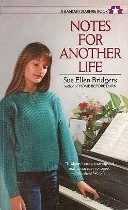 Sue Ellen Bridgers •
Sue Ellen Bridgers •
Notes for Another Life •
Everyone in this book is aching, and you ache along with them. Thirteen-year-old Wren Jackson and her older brother, Kevin, are being raised by their grandparents after the loss of both parents—not to death, but to chronic depression in one case and an all-consuming career in the other.
Wren and her grandmother, the delightfully named Bliss, sing harmony in the car on their way to see Wren’s father in a mentution. “She understood the music. . . She felt it pull them together, bringing comfort and courage against the panic that accompanied every visit.” While Wren finds solace in music, Kevin turns to tennis. He throws himself into matches with a fervor intended to drown his longing for the mother who has abandoned them. “He had learned to touch carelessly, exposing no need of his own through his hands. He was always ready to let go.” Both of them know not to betray any hint of dependence around their parents, who can be frightened away like skittish horses.
Sue Ellen Bridgers has created an extraordinarily sensitive portrait of adolescence in this torn-apart family. She takes the simplest of elements—a tractor pull, a broken arm, a camping trip—and through them reveals every facet of her characters. “Bliss always said you could tell the old middle class from the new one by their porch furniture: the old had wicker, the new had folding aluminum. Naturally, the Jacksons had a wicker sun porch.”
Upstairs in their red-brick house a small lamp is kept lit: “Wren’s light, they once had called it, but now it was everybody’s light, making visible a familiar place than in pitch black would be so foreign. ’Give me something to see by,’ Wren had said. And so they had provided the little lamp.”





Your email address will not be published.